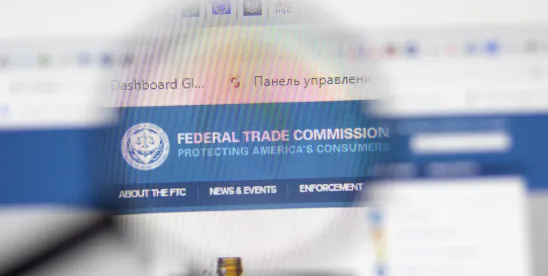- The FTC staff recently published a blog post outlining four factors for companies to consider when developing or deploying AI products to avoid running afoul of the nation’s consumer protection laws.
- The blog post does not represent formal guidance but it likely articulates the FTC’s thinking and enforcement approach, particularly regarding deceptive claims about AI tools and due diligence when using AI-powered systems.
- Although the blog post comes just days before current Republican Commissioner Andrew Ferguson becomes FTC Chair on January 20, the FTC is likely to continue the same focus on AI as it relates to consumer protection issues as it has under Chair Khan. Ferguson has voted in support of nearly all of the FTC’s AI consumer protection actions, but his one dissent underscores how he might dial back some of the current FTC’s aggressive AI consumer protection agenda.
The FTC staff in the Office of Technology and the Division of Advertising Practices in the FTC Bureau of Consumer Protection released a blog outlining four factors that companies should consider when developing or deploying an AI-based product. These factors are not binding, but they underscore the FTC’s continued focus on enforcing the nation’s consumer protection laws as they relate to AI.
The blog comes just under two weeks before current Republican Commissioner Andrew Ferguson will become the FTC Chair. However, under Ferguson, as we discuss below, the FTC will likely continue its same focus on AI consumer protection issues, though it may take a more modest approach.
The Four Factors for Companies to Consider about AI
The blog post outlines four factors for companies to consider when developing or deploying AI:
- Doing due diligence to prevent harm before and while developing or deploying an AI service or product
- In 2024, the FTC filed a complaint against a leading retail pharmacy alleging that it “failed to take reasonable measures to prevent harm to consumers in its use of facial recognition technology (FRT) that falsely tagged consumers in its stores, particularly women and people of color, as shoplifters.” The FTC has “highlighted that companies offering AI models need to assess and mitigate potential downstream harm before and during deployment of their tools, which includes addressing the use and impact of the technologies that are used to make decisions about consumers.”
- In 2024, the FTC filed a complaint against a leading retail pharmacy alleging that it “failed to take reasonable measures to prevent harm to consumers in its use of facial recognition technology (FRT) that falsely tagged consumers in its stores, particularly women and people of color, as shoplifters.” The FTC has “highlighted that companies offering AI models need to assess and mitigate potential downstream harm before and during deployment of their tools, which includes addressing the use and impact of the technologies that are used to make decisions about consumers.”
- Taking preventative steps to detect and remove AI-generated deepfakes and fake images, including child sexual abuse material and non-consensual intimate imagery
- In April 2024, the FTC finalized its impersonation rule, and the FTC also launched a Voice Cloning Challenge to create ways to protect consumers from voice cloning software. The FTC has previously discussed deepfakes and their harms to Congress in its Combatting Online Harms Report.
- In April 2024, the FTC finalized its impersonation rule, and the FTC also launched a Voice Cloning Challenge to create ways to protect consumers from voice cloning software. The FTC has previously discussed deepfakes and their harms to Congress in its Combatting Online Harms Report.
- Avoiding deceptive claims about AI systems or services that result in people losing money or harm users
- The FTC’s Operation AI Comply, which we covered, as well as other enforcement actions have taken aim at companies that have made false or deceptive claims about the capabilities of their AI products or services. Many of the FTC’s enforcement actions have targeted companies that have falsely claimed that their AI products or services would help people make money or start a business.
- The FTC’s Operation AI Comply, which we covered, as well as other enforcement actions have taken aim at companies that have made false or deceptive claims about the capabilities of their AI products or services. Many of the FTC’s enforcement actions have targeted companies that have falsely claimed that their AI products or services would help people make money or start a business.
- Protecting privacy and safety
- AI models, especially generative AI ones, run on large amounts of data, some of which may be highly sensitive. “The Commission has a long record of providing guidance to businesses about ensuring data security and protecting privacy,” as well as taking action against companies that have failed to do so.
- AI models, especially generative AI ones, run on large amounts of data, some of which may be highly sensitive. “The Commission has a long record of providing guidance to businesses about ensuring data security and protecting privacy,” as well as taking action against companies that have failed to do so.
While the four factors highlight consumer protection issues that the FTC has focused on, FTC staff cautions that the four factors are “not a comprehensive overview of what companies should be considering when they design, build, test, and deploy their own products.”
New FTC Chair: New or Same Focus on AI Consumer Protection Issues?
The blog post comes under two weeks before President-elect Trump’s pick to lead the FTC, current FTC Commissioner Andrew Ferguson, becomes the FTC Chair. Under Chair Ferguson, the FTC’s focus on the consumer protection side of AI is unlikely to undergo significant changes; Ferguson has voted in support of nearly all of the FTC’s consumer protection AI enforcement actions.
However, Ferguson’s one dissent in a consumer protection case brought against an AI company illuminates how the FTC under his leadership could take a more modest approach to consumer protection issues related to AI. In his dissent, Commissioner Ferguson wrote:
The Commission’s theory is that Section 5 prohibits products and services that could be used to facilitate deception or unfairness because such products and services are the means and instrumentalities of deception and unfairness. Treating as categorically illegal a generative AI tool merely because of the possibility that someone might use it for fraud is inconsistent with our precedents … and risks strangling a potentially revolutionary technology in its cradle.
Commissioner Ferguson’s point seems well taken.Less clear is where he would draw the line.Moreover, as a practical matter, his ability to move the needle would likely need to wait until President Trump’s other nominee, Mark Meador, is confirmed, as expected, later this year.
Matthew Tikhonovsky also contributed to this article.






 />i
/>i
